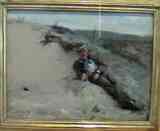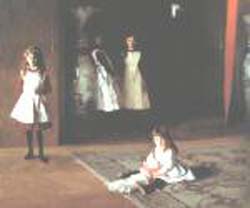John
Singer Sargent -- Letters
(Frontpage )
Ralph
Curtis' to his parents May 1884

Ralph
Curtis on the Beach at Scheveningen
My
Dear People,
Your
paper will be ordered this a.m. Yesterday the birthday or funeral of a
painter Scamps (John Sargent). Most exquis. weather. Walked up Champs E.
chestnuts in full flower and dense mob of "tout Paris" in pretty clothes,
gesticulating and laughing, slowly going into the Ark of Art. In 15 mins.
I saw no end of acquaintances and strangers, and
heard everyone say "ou est le portrait Gautreau?" "Oh allez voir ca"
[1] -- John covered with dust stopped with his
trunks at the club the night before and took me on to his house where we
dined. He was very nervous about what he feared, but his fears were far
exceeded by the facts of yesterday. There was a grande tapage[2]
before it all day. In a few minutes I found him dodging behind doors to
avoid friends who looked grave. By the corridors he took me to see it.
I was disappointed in the colour. She looks decomposed. All the
women jeer. Ah voilà "la belle!' "Oh quel horreur!" [3]
etc. Then a painter exclaims "superbe de style.
"magnifique d'audace!" "quel dessin!"
[4] Then the blageur club man-- "C'est une copie!"
"Comment une cope?" "Mais oui--la peinture d'aprés un
autre morceau de peinture s'appele une copie."
[5] I heard that. All the a.m. it was one series
of bons mots, mauvaises plaisanteries [6]
and fierce discussions. John, poor boy, was navré
[7]
. We got out a big déjeuner
[8]
at Ledoyens of a dozen painters and ladies and I took
him there. In the p.m. the tide turned as I kept saying it would. It was
discovered to be the knowing thing to say "étrangement épatant!"
[9]
I went home with him, and remained there while he
went to see the Boits. Mde. Gautreau and mére
came to his studio "bathed in tears." I stayed them off but the mother
returned and caught him and made a fearful scene saying "Ma fille est perdue--tout
Paris se monque d'elle. Mon genre sera forcé de se battre. Elle
mourira de chagrin" [10]
etc. John replied it was against all laws to retire
a picture. He had painted her exactly as she was dressed, that nothing
could be said of the canvas worse than had been said in print of her appearance
dans le monde [11]
etc. etc. Defending his cause made him feel much better.
Still we talked it over till 1 o'clock here last night and I fear he has
never had such a blow. He says he wants to get out of Paris for a time.
He goes to Eng. in 3 weeks. I fear là bas he will fall
into Pre-R. influences wh. has got a strange hold of him he says since
Siena.
I want
him to go to Seville and do the
tobacco girls with me in Nov. Says he will--nous verrons.
[12]
(letter from
Ralph
Curtis' to his parents 1884; quoted in Charteris; John Sargent;
pp. 61-62)
Notes:
1) "ou
est le portrait Gautreau?" "Oh allez voir ca"
| Have
you seen the Gautreau portrait ? You must see it. |

2) grande
tapage

3) Ah
voilà "la belle!' "Oh quel horreur!
| Ah here
"the beautiful one! ' " Oh what a horror! |
Note- The comment was
a slam to both Gautreau and Sargent. This period in Paris, was moving into
la belle époque (or the beautiful time) when paintings were done
to flatter the patron and show them (especially women) at their most beautiful.
Gautreau was a great beauty but Sargent was showing her at her most sexual,
and the women were aghast.
Interestingly enough, it
would be Sargent's friends Paul
César Helleu and Giovanni
Boldini who go on to champion La Belle Époque, but by the 1890's
times had changed and it was actually desirable to have a bit of sexuality
infused in the portrait.

4)
"superbe de style. "magnifique d'audace!" "quel dessin!"
| "superb
style," " magnificent audacity! " " what a painting! " |

5) "C'est
une copie!" "Comment une cope?" "Mais oui--la peinture
d'aprés un autre morceau de peinture s'appele une copie."
(Editor's Note --
I can't translate this very well)
It is
a copy! " " How, a copy? " " Yes -- the painting is part of aprés
another piece copied from appele. " |

6) bons
mots, mauvaises plaisanteries
| -- witty
remarks, bad jokes |

7) navré

8) déjeuner

9) "étrangement
épatant!"

10) "Ma
fille est perdue--tout Paris se monque d'elle. Mon genre sera forcé
de se battre. Elle mourira de chagrin"
| "
My daughter is lost -- all of Paris mocks her. Our family will be
humiliated. She will die a broken heart " |

11) dans
le monde
| or as
she was sen in person |

12) nous
verrons

The Boit Family
The Boits: Edward Darley and his
wife Mary Louisa were friends of Sargent. They were part of the expatriate
American community living in Paris at the time. Edward was a Harvard trained
lawyer from Boston turned painter and it was the Boit's children that John
painted in 1882 then showed at the Salon the following year to quite a
bit of critical stir. Being artist themselves, they gave John full latitude
in his painting of their children and I think they would have been very
sympathetic to he troubles and a source of solace to his grief.

Daughters
of Edward Darley Boit
1882

John Sargent
Fall to Pre-Raphael Influences?
When I first read Ralph
Curtis' letter, I thought it strange that a very good friend would be worried
about Sargent turning toward the Pre-Raphael
Brotherhood and I didn't understand why since it seemed to me that
his notion or art really didn't align itself with the Pre-Raphael Brotherhood.
In fact some sources have even chosen to delete this part of the letter.
But the answer has come to me more
recently. It seems Curtis had grounds for his concerns. Henry
James had taken a liking to the young fellow expatriate American painter
and in the spring of 1884, just prior to the Paris Salon, James talked
him into visiting London where he wined and dined Sargent trying to influence
the young artist by way of introductions to some of the prominent pre-Raphaelite
painters of the time such as Joshua Reynolds, Frederic Leighton, John Everett
Millais, Edwin Austin Abby, and Burne-Jones -- among others.
Sargent had enjoyed his time in London
and Curtis must have known this from their conversations. There was a credible
concern for Curtis to think that Sargent may be looking in a new direction
